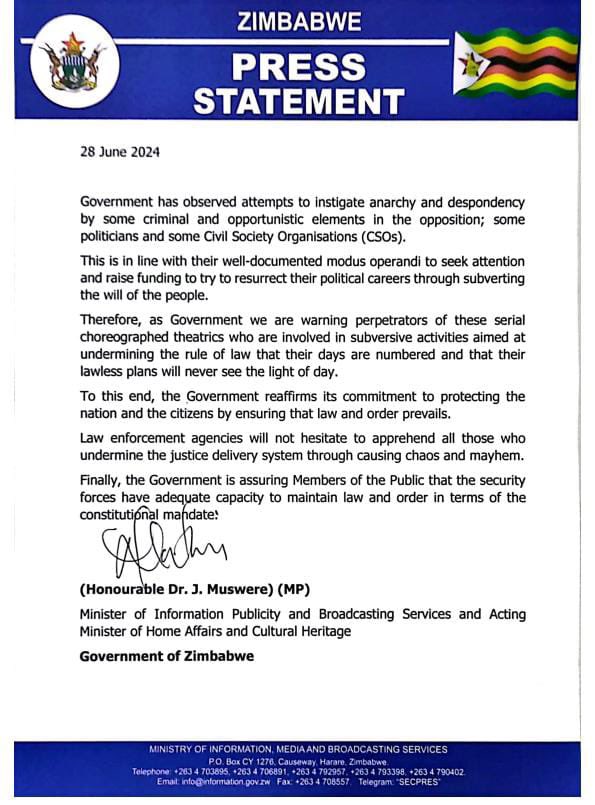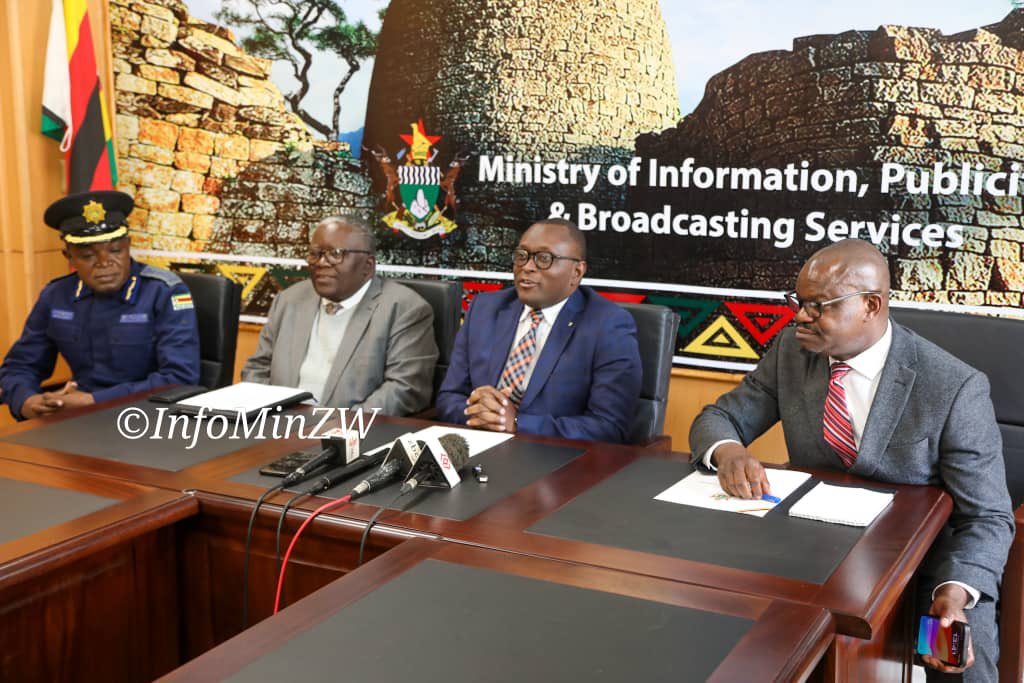By Arnold Tsunga
He signs as both Minister of Information, Publicity and Broadcasting Services as well as Minister of Home Affairs and Cultural Heritage. Both these ministries are so critical as national policy infrastructure for the protection of fundamental human rights of the Zimbabwean people.

The Ministry of Information Publicity and Broadcasting portfolio should have as its core business the obligation to promote, protect and fulfill the right to freedom of expression of the people of Zimbabwe. The Ministry of Home Affairs should have as its core business promoting, protecting and fulfilling the fundamental rights and freedoms of the people of Zimbabwe. The right to freedom of expression includes the right to receive and disseminate information.
In the era of digitisation, the right to the internet which is an information highway is also guaranteed as digital rights are also human rights that the government equally must promote, protect and fulfil. The importance of the right to freedom of expression and other fundamental rights such as association, assembly, movement and protests is highlighted by the fact that these are protected in part 4 of the constitution of Zimbabwe, The Bill of Rights.
The Bill of Rights is so important that the rights codified in there are justiceable through direct access for protection through the Constitutional Court whose core mandate is protection of constitutional rights. The importance of fundamental rights is also reflected by the fact that as a nation we made it very difficult to amend the Constitution on the Bill of Rights. To amend the Bill of Rights a referendum is needed. When we adopted the constitution with over 93% of a vote, we the people said it is not enough for Parliament alone to change the constitution on the Bill of Rights. Parliament must come back to us via a referendum if they want to change the Bill of Rights so that the change is made by the people.
No Minister of government has a right to change or undermine the implementation or enjoyment of fundamental rights. It is unconstitutional and a severe breach of the law to do that. The constitution is very explicit in section 2 that it is the supreme law of the land that is binding on everyone, more so Ministers, police, and security services who must facilitate, protect and fulfill the constitutional rights. Any conduct or law that is inconsistent with the Constitution is to the extent of that inconsistency null and void. The importance of facilitating, promoting and fulfilment of fundamental rights is emphasized in the constitution by reference to the Founding Values and national objectives in the constitution which are among others protecting of human rights, observance of good governance and the rule of law.
The Minister’s statement on the face of it is at complete variance with these legal principles binding on him and the entire government of Zimbabwe including the police and security agencies. It is not self-evident what information the Minister is relying on, but it betrays a sense of unusual panic and fear on his part. Fear and panic are not a sufficient basis or justification to act unconstitutionally and in breach of the rule of law and principles of constitutionalism. For example, he threatens an indeterminate number of people without precision and indirectly permits security services to act arbitrarily and indiscriminately. That is illegal and can be incitement to commit crimes against unarmed civilians by the security sector.
If the government has specific information about specific people bent on lawlessness, it should simply target the very specific people and protect everyone else. The vagueness in the Minister’s threat creates conditions for dragnet arrests that cause immense suffering and trauma to innocent civilians through torture, violence, arbitrary arrests and detentions. This image of our country is very damaging especially as we approach the SADC Heads of State summit.
As I end I will address two more points.
The first is that if the government desires to claw back on the enjoyment of fundamental rights such as expression, association, movement and protest provided for in the constitution of Zimbabwe, then it has to comply with principles of legality, legitimacy, necessity and proportionality. It must also be mindful that certain rights are non-derogable, such as the right to life, fair trial, to justice and freedom from torture, inhuman and degrading treatment that normally happens when there are dragnet arrests that the Minister’s unfortunate statement can incite when he says “their days are numbered”.
The second point is a reference by the Minister in his statement to “Law enforcement agencies” and “security forces” in the maintenance of law and order. The duty of policing lies with the police. The security forces have no mandate to police. It is an abuse of power, illegal and unconstitutional to deploy the army without strict compliance with the law. Our country has the experience of deployment of the army and other security forces to deal with civilians in a way that has resulted in the unfortunate use of disproportionate force against unarmed civilians. One such situation resulted in our president setting up the Commission of Inquiry chaired by former President Monhlante whose recommendations remain unimplemented. The deployment of the military and use of force against civilians must comply with core principles applicable in such situations that is, legality, precaution, non-discrimination, necessity and proportionality. Nothing from the Minister’s statement shows that the country has reached this situation.
Arnold Tsunga is a human rights lawyer and the Principal Managing Director of Tsunga Law International.

